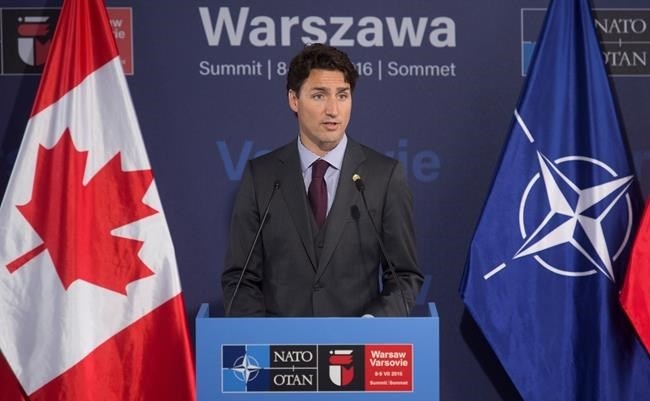
Canadian Prime Minister Justin Trudeau speaks with the media following the NATO summit in Warsaw, Poland Saturday July 9, 2016.
Image Credit: THE CANADIAN PRESS/Adrian Wyld
July 09, 2016 - 2:02 PM
WARSAW, Poland - Prime Minister Justin Trudeau says his government was "extremely enthusiastic" about helping NATO in Eastern Europe, and that a display of force is essential to make sure Russia understands the alliance is united in opposing its "illegitimate" actions.
Trudeau was speaking at the end of a two-day summit in Warsaw, where NATO leaders moved to boost the alliance's military presence in the Baltic countries and Poland to reassure Eastern European members and deter further Russian aggression in the region.
Canada has agreed to send around 450 soldiers to Latvia, where they will form the core of a 1,000-strong battlegroup comprised of troops from other NATO countries. It has also pledged to keep one of its warships in the region and occasionally send fighter jets.
There was a sense that the Liberal government, which campaigned on a promise to increase Canada's involvement in peacekeeping, was reluctant to get drawn into NATO's standoff with Russia.
Germany, the United Kingdom and the U.S. confirmed weeks ago that they were prepared to send large numbers of troops to help the alliance in Eastern Europe.
Canada's announcement came late last month, and only after U.S. President Barack Obama and NATO Secretary General Jen Stoltenberg took the unusual step of publicly asking the Canadian government to step up.
Asked about this perceived hesitancy, however, Trudeau told reporters: "Canada was, on the contrary, extremely enthusiastic about continuing to step up, as we have over the 67 years of NATO's existence in ways that are helpful to the alliance.
"Leading efforts in Latvia," he added, "was exactly something we saw as an opportunity for Canada to contribute security and stability, defence and deterrence at a time where that's very much necessary."
Earlier in the day, Foreign Affairs Minister Stephane Dion told the Canadian Press that it was "terribly unfortunate" that Canada had to send troops to Latvia instead of using them on a peacekeeping mission in Africa or another part of the world.
However, he said contributing to the NATO effort is something "we need to do so because Russia had a completely unacceptable behaviour, regarding especially Ukraine."
Some, like Germany's foreign minister, have questioned the wisdom of deploying a NATO force on Russia's borders, suggesting it would aggravate tensions between the alliance and Moscow. Trudeau, who campaigned on a promise to re-engage with Russia, defended the move.
Russia poses a challenge to security and stability in Ukraine, the rest of Eastern Europe and elsewhere, he said, and NATO must show that it stands united and won't accept "illegitimate" Russian actions.
"We need to ensure that Russia is getting that message consistently and clearly from all members of NATO," he said. "That's really what this meeting is focused on."
Trudeau suggested the force could actually help move discussions with Russia toward a peaceful end to the current crisis, which Canada and NATO hope will end with the return of Crimea to Ukraine and an easing of tensions in the region.
That may be wishful thinking. In a statement, a spokesman for the Russian Embassy in Canada described the deployment of NATO forces to Eastern Europe as "sabre-rattling" and a "reincarnation of Cold War containment."
"Russia is in no way presenting a threat to anyone," Kirill Kalinin added. "However, we see this is a challenge and we will find necessary means to respond to it."
The focus now is which NATO members will also send troops to Latvia to grow the force there to about 1,000 soldiers. Speaking to the Canadian Press after meeting Trudeau, Latvian President Raimonds Vejonis said his country will work with Canada to find suitable partners.
"We will work together with Canada to find other nations who will support us and join this multinational battalion," he said. "It's not always an easy job. It is the reason why we will work with Canada."
One senior official, speaking on background, said defence chief Gen. Jonathan Vance spent much of the NATO summit working the halls trying to find appropriate partners. Ultimately, the official said, it will be up to Canada to pull together and organize a 1,000-strong battalion in Latvia.
Vejonis said Latvia will also need to begin preparing for the Canadians to arrive, likely early next year. "We still need to invest in some infrastructure," he said, "and now we will discuss what kind of infrastructure the Canadians need."
The former Soviet republic spent only 1.04 per cent of its gross domestic product on defence last year, but has promised to double that to two per cent by 2018. Even then, however, that will only amount to just over $1 billion. Canada spends about $20 billion per year on defence.
- Follow @leeberthiaume on Twitter.
News from © The Canadian Press, 2016